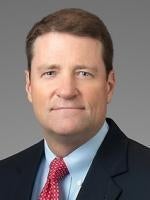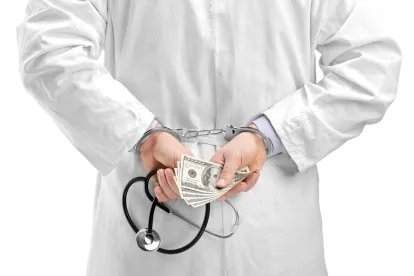On October 24, 2018, President Trump signed the “Substance Use Disorder Prevention that Promotes Opioid Recovery and Treatment for Patients and Communities Act” or the “SUPPORT for Patients and Communities Act” (the “SUPPORT Act”) into law (See, “Congress Passes ‘SUPPORT for Patients and Communities Act’ – A Rare Example of Bi-Partisanship” Sheppard Mullin Healthcare Law Blog, October 12, 2018). The SUPPORT Act is wide-ranging legislation comprised of over 120 separate bills aimed at combatting the opioid crisis and impacting every corner of the healthcare continuum.
Providers, who are seen as the front line in the treatment and prevention of opioid abuse, should be aware of the changes this law brings and how such changes may affect their federal healthcare compliance obligations.
In this blog article, we are focusing on Section 8122 of “Eliminating Kickbacks in Recovery Act of 2018” (“Eliminating Kickbacks in Recovery Act”) (See, 18 U.S.C. §220), – one of the Support Act’s constituent bills. More specifically, we are focusing on the impact that the Eliminating Kickbacks in Recovery Act has on physician-owned laboratories.
Eliminating Kickbacks in Recovery Act; Recovery Kickback Prohibition
The Eliminating Kickbacks in Recovery Act, one of the SUPPORT Act’s constituent bills, makes it a federal crime to receive or offer “[i]llegal remunerations for referrals to recovery homes, clinical treatment facilities, and laboratories” (the “Recovery Kickback Prohibition”). Violation of the Referral Kickback Prohibition is punishable by a fine of no more than $200,000 and imprisonment of not more than 10 years for each occurrence.
While providers may be familiar with similar prohibitions in the Federal Anti-Kickback Statute (42 U.S.C. 1320a-7b(b) (the “Federal AKS”), the Recovery Kickback Prohibition is very different than the Federal AKS prohibitions.
Closing the Gap. In an effort to close the “gap” Congress felt was left by the Federal AKS, the Recovery Kickback Provision was created to reach these patient brokering arrangements, including those involving laboratories, that would otherwise fall outside the scope of the AKS. The new prohibition therefore does not preempt the Federal AKS or state laws.
Only Applies to Certain Entities. The Recovery Kickback Prohibition, unlike the Federal AKS, only applies to certain entities (i.e., recovery homes, clinical treatment facilities, and laboratories), and is a direct response to Congressional concern over “patient brokering,” a practice employed by some recovery homes and treatment facilities where third parties, known as “body brokers” in the rehabilitation and recovery arena,[1] recruit patients for homes/facilities in exchange for kickbacks from the home/facility that received the body broker’s referral. The recipient home/facility would then receive money for the treatment of the referred patients through health insurance reimbursements.
All Payors. As referenced above, whereas the Federal AKS applies only to referral of patients who are covered by a “Federal Health Care Program,”[2] the Eliminating Kickbacks in Recovery Act extends its prohibitions to any and all health care benefit programs – defined by the Federal Criminal Code as “any public or private plan or contract, affecting commerce, under which any medical benefit, item, or service is provided to any individual, and includes any individual or entity who is providing a medical benefit, item, or service for which payment may be made under the plan or contract.” 18 U.S. Code § 24(b). In effect, the federal government can now police strictly private market arrangements for conflicts of interest (i.e., between private providers and commercial insurers).
All Services. In addition to the all-payor aspects of the Recovery Kickback Prohibition, it is also worth noting that the Recovery Kickback Prohibition applies with respect to the solicitation or receipt of remuneration for any referrals to recovery homes, clinical treatment facilities, or clinical laboratories, whether or not related to treating substance use disorders. The broad application of the Recovery Kickback Prohibition to the treatment of all categories of healthcare treatment (not just substance abuse treatment) makes it even more important for impacted providers – including physician-owned laboratories – to understand and consider the Eliminating Kickbacks in Recovery Act when evaluating their compliance status.
The Exceptions
There are certain statutory exceptions to the Recovery Kickback Prohibition – many of which mirror (or even directly reference) the safe harbors under the Federal AKS – which exempt certain arrangements from the prohibition. These exceptions include:
- Certain disclosed discounts under a health care benefit program;
- Certain payments to bona fide employees and independent contractors;
- Discounts on drugs furnished under the Medicare coverage gap discount program;
- Payments for services that meet the Federal AKS safe harbor for personal services and management contracts;
- Certain coinsurance and copayment waivers and discounts;
- Certain federally qualified health center arrangements that meet the Federal AKS exception; and
- Remuneration made pursuant to certain arrangements that the secretary of US Department of Health and Human Services deems necessary.
It should be noted that while the Eliminating Kickback Act does include an exception for certain bona fide employment and independent contractor arrangements, unlike the exception under the Federal AKS, it does not seem to permit productivity or incentive-based compensation. In fact, it specifically prohibits payments to employees or independent contractors that are determined or vary by “the number of individuals referred to a particular recovery home, clinical treatment facility, or laboratory; [] the number of tests or procedures performed; or [] the amount billed to or received from, in part or in whole, the health care benefit program from the individuals referred to a particular recovery home, clinical treatment facility, or laboratory . . . .” Therefore, while paying employees based on their productivity, generally measured by their personally performed services or benchmarks, is permissible under previous fraud and abuse laws, this practice is impermissible for addiction recovery employees, at least by the methods explicitly prohibited in the statute.
Physician Laboratory Arrangements
Over the past several years, there has been a proliferation of “physician-investor” laboratory arrangements where physicians invest, and become owners in, laboratories. This investment arrangement can provide substantial returns for the physician-investors, as they control their referrals to the laboratories which, in turn, distribute the lab’s profits to the physician-investor that are typically related to the volume or value of the referrals of that physician to the lab.
Because Federal AKS enforcement efforts have been limited to conduct involving Federal Health Care Program beneficiaries, physicians would refer only their non-federally and non-state covered patients (i.e., self-pay and privately insured patients) to avoid implicating federal fraud and abuse laws. The Recovery Kickback Provision materially changes the landscape by expanding the government’s reach to private market payors. Laboratories that previously did not need to structure their business and operations around the Federal AKS because they did not receive money from federal health care programs now need to reevaluate and, perhaps, restructure their arrangements to ensure that they are addressing this new compliance risk. Given that the Trump Administration has made ending the opioid crisis a priority, it is expected that the Department of Justice will aggressively pursue those individuals and entities that violate the Eliminating Kickbacks Act. Consequently, providers in the physician-owned laboratory business, as well as recovery homes, clinical treatment facilities, and other laboratories, need to pay careful attention to this new law, lest they may run afoul of it vis-à-vis reimbursement from private payors.
[1] Patient brokers are often referred to as “runners,” “cappers,” and “steerers.”
[2] The term “Federal Health Care Program” is defined by the Federal AKS to include, “any plan or program that provides health benefits, whether directly, through insurance, or otherwise, which is funded directly, in whole or in part, by the United States Government or a State health care program (with the exception of the Federal Employees Health Benefits Program.” 42 U.S.C. 1320a–7b(f).





 />i
/>i

